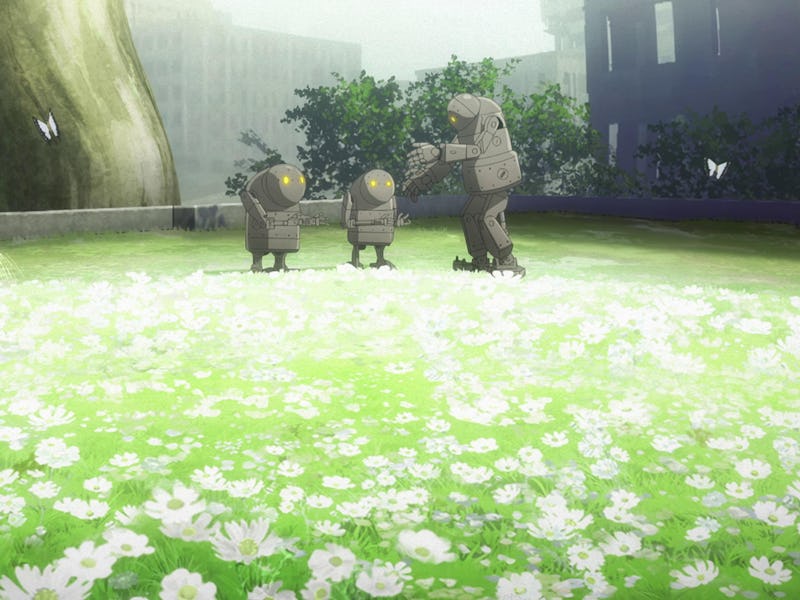NieR anime Episode 2 takes bigger risks than The Last of Us premiere
No one will judge you for shedding a (lunar) tear.

The premiere of NieR: Automata Ver 1.1a stuck so close to the script of the game it was based on, dispelling any worries that it would not be a faithful adaptation of its source material. The second episode flips the script entirely, introducing new plot threads and characters in an emotionally devastating episode that makes it clear to everyone that this will deliver on the high expectations fans have of the property and the mind of creator Yoko Taro. These exciting changes set the stage for what is shaping up to be the best video game adaptation currently streaming.
Flowers for PLAO8 — Anyone who played NieR: Automata recognized that the anime adaptation’s premiere was all but a shot-for-shot remake of the game’s opening mission. But in a series known for its highly unorthodox storytelling that breaks so many traditional rules, something was missing. Episode 2 starts with a completely different approach, one that pays off.
Raise your hand if this robot made you cry.
Much of Episode 2’s runtime is dedicated to the near-wordless story of machine lifeform PLAO8, who breaks from their programming of destroying the resistance in pursuit of planting and growing a field of flowers across the desolate landscape. As opposed to both the resistance fighters and their red-eyed brethren, PLAO8 has no care for the endless conflict around them and amasses a small following of co-gardeners.
As the episode comes to a head in a confrontation between the resistance and the machine lifeforms, PLAO8 is caught in the middle. They are forced to watch their garden be trampled as it becomes another victim in the conflict PLAO8 sought to remove themself from.
PLAO8 also becomes a victim, and in their final moments is faced with a flower — the thing that brought them into a new way of thinking about the world.
This short narrative of PLAO8 so effectively speaks to the themes of NieR: Automata while being original to the anime, marking it as a triumph that sets viewer expectations high.
Lily, Drakengard, and what awaits in Episode 3 — What works so well about PLAO8’s tragic story in Episode 2 is how understated the story is communicated to the viewer. A quiet, somber story that relies heavily on visual themes rather than telling the audience what to think cuts directly into an emotional reaction.
Episode 2 begins to introduce viewers to the larger world of NieR.
Episode 1’s almost perfect recreation of the game does not stray from the source material to invest the viewers in the story of 2B and 9S while giving them only what they need to know about the much vaster world around them. Episode 2 takes the opportunity of an enraptured audience to present a new story.
It also leans more heavily into laying the groundwork for later diversions from the game, with references in plethora for returning fans of the franchise to scratch their heads over. One moment of note is a stack of TVs (a recurring motif in the series) that show various pieces of footage, one that shows a broadcast of Drakengard’s Ending E, which leads to the events of NieR: Automata.
But PLAO8 isn’t the only new face Episode 2 introduces. Resistance fighter Lily is new to the story of Automata, but not new to NieR entirely. Oddly enough there is a series of prequel plays in which Lily appears. She has some important relationships with major players in Automata that could lead to interesting deviations from the game. Fans old and new will both be left asking questions as to what her apprehensive reaction to seeing 2B means.
While some video game adaptations feel the need to handhold the audience and spend over an hour hammering home repetitive imagery and heavy-handed themes, NieR accomplishes something truly impressive in the span of less than half an hour — it changes the viewer.
I still can’t stop thinking about the story of PLAO8, it is as beautifully realized as anything in NieR: Automata and demonstrates how adaptation can succeed. Combined with mysterious picture-book interludes, new and old faces, and easter eggs it helps Ver1.1a not only live up to the game but justify its existence alongside it.